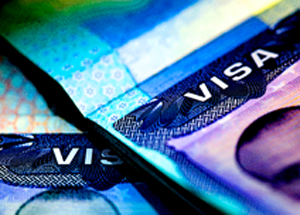It's Diversity Visa Lottery time again!
No other nation in the world runs a lottery for immigrant visas, only the United States.

Between now and noon on November 2, aliens from most — but not all — of the nations of the world can join the lottery for some 50,000 immigrant visas. People with no required connections to America, and with no special skills. The eligibles include illegal aliens, from the right nations, now in the United States.
The main irony is the very existence of this program, which, its backers say, will bring more diversity to the mix of arriving immigrants. It is a feeble excuse for distributing valuable entry tickets to this highly desired nation. For more on this useless bit of immigration policy, see "What's Wrong with the Visa Lottery?", congressional testimony by my colleague Steven Camarota.
The rules are pretty simple. People from most of the globe can apply, except those from a list of 19 nations that have sent us more than 50,000 people in the last five years, nations such as Bangladesh, India, Mexico, and Pakistan. This year's list of excludees includes Nigeria for the first time, because its people have been so successful in applying for these diversity visas in the immediate past. Bangladesh was recently added to the excluded list for the same reason.
To apply, you have to have a high school education or hold a job that requires two years of training (a murky concept at best). There were more than 4.9 million applications in the FY 2012 round of the lottery, with close to 900,000 coming from Bangladesh and, at the other end of the spectrum, 10 from Cocos Islands, the tropical island Australian colony near Indonesia.
Generally, no one may apply more than once a year, and the State Department says it has sophisticated software to prevent duplicate entries; however, the rules of the application process are such that there is a mild tilt to two different favored sub-populations: the computer-literate and the married.
The State Department instructions for the program say that you must apply online, which presumably reduces the number of applications from those without computer skills or the money needed to rent those skills. The same document indicates that while individuals can apply only once, each member of a married pair (including same-sex couples) can apply, and if one of them wins that person can bring along his or her spouse. So, if you are married, and if both you and your spouse apply, you get two bites at the apple, not one.
All of these are nuances, of course. The program should simply be dropped as extraneous.
Other Ironies. While people born in most of mainland China and in mainland Great Britain are excluded from the program because we have many, many migrants from those places, some Chinese and some Brits turn out to be eligible. In a sense, they are more equal than others.
You can apply for the program if you are a British citizen, but only if you were born in Ulster. (Do I hear the sounds of the Irish lobby?) Similarly, you can apply if you are Chinese, but only if you were born in Taiwan, a former Japanese colony, or in the old Portuguese colony of Macau, or in the former British colony of Hong Kong.
But what if you are Chinese and you had been born in a different once-colonial territory, like Manchuria, which was controlled by Japan, or in the former Russian and later Japanese colony of Port Arthur, or in the long-gone Austrian, Belgian, French, German or Italian concessions (quasi colonies) in Tianjin or elsewhere? No, you cannot apply; some colonial backgrounds are, apparently, more equal than others.
Speaking of geographic trivia, every year I look at the State Department's listing of nations eligible for this program to see how it handles a couple of specifics. While the list routinely places Hong Kong in Asia (where it is), this year it has again listed Macau in Europe.
Similarly, while nations are routinely listed in alphabetical order, there are always these names at the end of the Oceania category: "Tonga, Tuvalu, Vanuatu, and Samoa" in that order. This is not our Samoa, or American Samoa, this is the other one, the former New Zealand colony. Why is it out of place?
My theory is that it changed its name from "Western Samoa" to "Samoa" a few years ago, and State (correctly) picked up the new name, but did not bother to re-arrange these island nations in alphabetical order.
I suppose, at a time of too much change, it is reassuring to see the year-after-year stability of minor mistakes like the Macau and Samoa ones.
